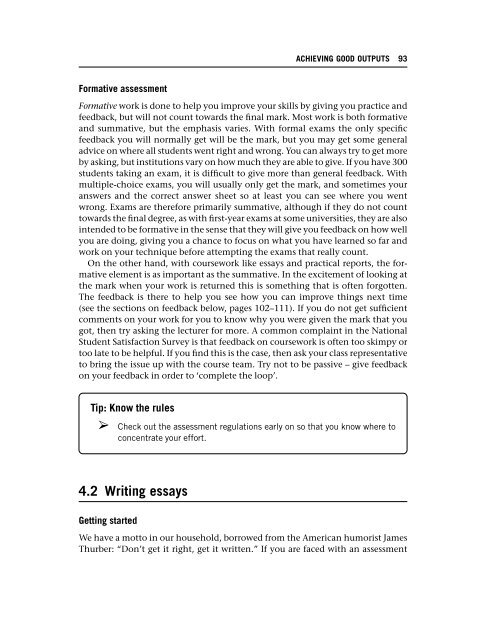Psychology - Forgot your username
Psychology - Forgot your username
Psychology - Forgot your username
You also want an ePaper? Increase the reach of your titles
YUMPU automatically turns print PDFs into web optimized ePapers that Google loves.
Formative assessment<br />
Formative work is done to help you improve <strong>your</strong> skills by giving you practice and<br />
feedback, but will not count towards the final mark. Most work is both formative<br />
and summative, but the emphasis varies. With formal exams the only specific<br />
feedback you will normally get will be the mark, but you may get some general<br />
advice on where all students went right and wrong. You can always try to get more<br />
by asking, but institutions vary on how much they are able to give. If you have 300<br />
students taking an exam, it is difficult to give more than general feedback. With<br />
multiple-choice exams, you will usually only get the mark, and sometimes <strong>your</strong><br />
answers and the correct answer sheet so at least you can see where you went<br />
wrong. Exams are therefore primarily summative, although if they do not count<br />
towards the final degree, as with first-year exams at some universities, they are also<br />
intended to be formative in the sense that they will give you feedback on how well<br />
you are doing, giving you a chance to focus on what you have learned so far and<br />
work on <strong>your</strong> technique before attempting the exams that really count.<br />
On the other hand, with coursework like essays and practical reports, the formative<br />
element is as important as the summative. In the excitement of looking at<br />
the mark when <strong>your</strong> work is returned this is something that is often forgotten.<br />
The feedback is there to help you see how you can improve things next time<br />
(see the sections on feedback below, pages 102–111). If you do not get sufficient<br />
comments on <strong>your</strong> work for you to know why you were given the mark that you<br />
got, then try asking the lecturer for more. A common complaint in the National<br />
Student Satisfaction Survey is that feedback on coursework is often too skimpy or<br />
too late to be helpful. If you find this is the case, then ask <strong>your</strong> class representative<br />
to bring the issue up with the course team. Try not to be passive – give feedback<br />
on <strong>your</strong> feedback in order to ‘complete the loop’.<br />
Tip: Know the rules<br />
➢ Check out the assessment regulations early on so that you know where to<br />
concentrate <strong>your</strong> effort.<br />
4.2 Writing essays<br />
Getting started<br />
ACHIEVING GOOD OUTPUTS 93<br />
We have a motto in our household, borrowed from the American humorist James<br />
Thurber: “Don’t get it right, get it written.” If you are faced with an assessment






